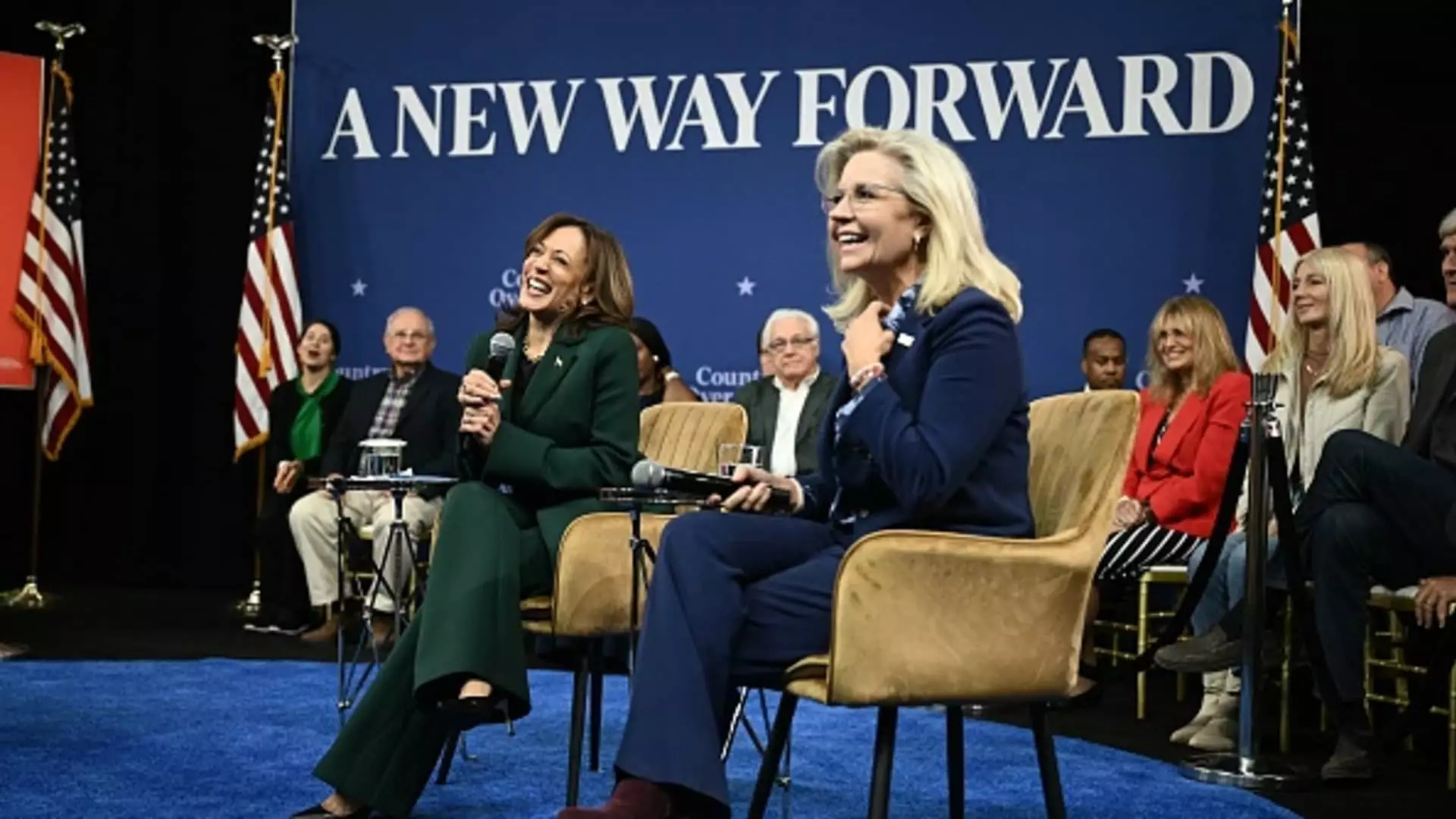In an era marked by deep political divisions, the collaboration between Vice President Kamala Harris and former Republican Representative Liz Cheney emerges as an audacious attempt to transcend party lines. Their joint appearances across pivotal battleground states such as Pennsylvania, Michigan, and Wisconsin symbolize a rebuke of partisan politics in favor of principled governance. They advocate a model of political engagement rooted in values rather than allegiance to party ideology, making a case that resonates with disillusioned voters from both sides of the aisle.
During their discussions, Cheney emphasized the importance of individual conscience in voting, declaring, “It’s not about party, it’s about right and wrong.” Her message speaks directly to Republicans who find themselves estranged from their party, particularly in light of the prevailing Trump-centric narrative. By encouraging voters to prioritize their values over blind party allegiance, Cheney aims to galvanize support for Harris, particularly among those who may feel conflicted about casting their votes amid increasing polarization.
Cheney’s endorsement of Harris explicitly illustrates the principle of prioritizing the Constitution. She remarked, “Every single thing in my experience has played a part in my decision to endorse Vice President Harris,” asserting that her support stems from a commitment to constitutional fidelity rather than mere party loyalty. This represents a significant move in a landscape where extreme partisanship often overshadows fundamental constitutional values.
Central to the discussions was the matter of women’s reproductive rights, an area where Cheney, despite her self-identified “pro-life” stance, expressed concern over recent legislative actions. “Draconian restrictions on women’s access to reproductive healthcare are not sustainable for us as a country,” she asserted. This statement underscores the growing recognition among conservatives that stringent reproductive laws may alienate moderate voters and threaten broader societal cohesion.
The dialogue surrounding women’s rights has transformed significantly in the wake of the Supreme Court’s decision to overturn Roe v. Wade. Cheney’s acknowledgment of the challenge posed by restrictive laws provides a unique perspective from within traditionally conservative circles, suggesting a potential shift in the values held by some Republican constituents.
The Harris campaign’s strategic focus on attracting disaffected Republicans marks a novel political strategy. The formation of the “Republicans for Harris” faction demonstrates an understanding of the necessity for a diverse coalition in the current political climate. As Harris remarked, inviting “good ideas from wherever they come from” could bolster the foundation for a more healthy and vigorous two-party system. This belief in the necessity of bipartisan dialogue could lead to a recalibration of political discourse, promoting collaboration over conflict.
As an integral figure in this dynamic, Cheney acts as a bridge for those hesitant to align with the Democratic party openly. She frames voting for Harris as a patriotic duty, stressing that “patriotic Republicans have a duty and obligation to do what we know is right for the country.” In doing so, Cheney creates a “permission structure” which could empower many voters to exercise their democratic rights in alignment with their ethical beliefs.
Another critical aspect of the conversations was the critique of former President Trump’s foreign policy positions, particularly his isolationist stance. Cheney’s warnings about the risks posed by neglecting international alliances, such as NATO, suggest a profound understanding of global interdependence. She emphasized the potential dangers of unraveling critical international agreements, articulating that “Without allies, America will find our very freedom and security challenged.”
Cheney’s perspective has significant implications for U.S. foreign policy moving forward. Her alignment with Harris on support for Ukraine against Russian aggression indicates a shared commitment to international cooperation and intervention when necessary. This partnership signifies a move toward a more assertive and engagement-oriented foreign policy perspective, countering Trump’s isolationist rhetoric which has defined recent Republican strategies.
The Future of Political Alliances
As the election nears, the partnership between Harris and Cheney illustrates a striking development in American politics. It highlights how ideological overlaps can manifest in unexpected alliances, driven by shared values and concerns for the nation’s future. Political strategists theorize that such collaboration can potentially reshape electoral landscapes by encouraging voters to consider candidates based on character and principles rather than strict party ideologies.
Cheney’s criticisms of Trump and devotion to constitutional values could represent a growing movement that advocates for integrity over loyalty to a party. This may pave the way for a new political identity that prioritizes national well-being over partisanship, presenting a beacon of hope for those yearning for a refreshed dialogue in American political discourse. As the election approaches, the outcomes of this partnership may set a precedent for future political collaborations across the aisle.


Leave a Reply